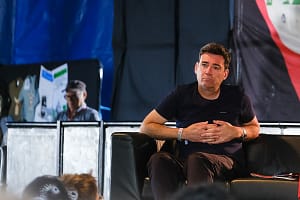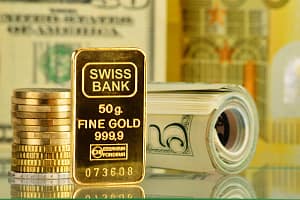Exhibitions are a load of old bollocks. There are too many of them, they’re too big and are mostly a waste of time and effort for everyone involved.
The exhibition (or expo if you’re cool) is largely a money-making exercise by organisers intent on filling every inch of floor space, regardless of whether it’s actually right for brands and sponsors:
“If you take the gold package, you’ll also get a speaking slot on the innovation stage… But what we won’t tell you is there are 15 other gold sponsors, 10 platinum sponsors, 8 diamond sponsors, 5 ultra-diamond sponsors, 3 super-mega-ultra-diamond sponsors and 2 headline sponsors.”
That marketers still bother with expos and large-scale events and can prove measurable return (that they couldn’t get spending their budgets on another activity) is beyond me.
But there is an alternative.
The beautifully curated, small scale gathering of like-minded individuals who are brought together for a common interest and to chew the fat on their area of expertise. Or “event” as it’s otherwise known.
Having been involved with many great events in multiple roles organiser, sponsor, speaker, attendee, there are a few key elements that need to be nailed to make your event a winner and as non-exhibitionary as possible.
Based on that experience I’ve created a formula you can use as an organiser to determine whether your event is going to be a success or not, or as an attendee to gauge whether it’s worth attending in the first place:
Event = Attendee Quality + Logistics x Cost1 x (Venue x Output x Agenda) Speakers
↑The Hook↑
Attendee Quality
If you’re event is for “everybody” then it’s really for nobody.
Ensuring the event is targeted at a specific audience will ramp up the benefit for the attendees, sponsors, speaker and organisers.
Attendees will be able to easily qualify themselves in or out based on who the event is aimed at. And if you get people who qualify themselves in it’s likely they’ll know similar people who would also be interested so will invite on your behalf.
Sponsors will know the exact audience attending the event. They’ll likely invest more to be there if it’s their target audience and can tailor their proposition and messaging accordingly. That means they’ll up their relevancy with that group of people, boost their strike rate and drive more ROI.
Speakers will love it because they’ll know the type of people in the audience so can mould their sessions to suit, pitching things at just the right level to be as useful, informative, controversial (or whatever) as possible.
And organisers should love it as they will satisfy the three main groups of stakeholders involved in events, increasing value for all and improving the likelihood of re-bookings and the event running again.
Quality, not quantity should be the watch word when it comes to the event attendees
Logistics
Events need to be run on days and at times that suit your audience. Don’t forget the event is for them.
Running a retail focused event? Don’t do it on Monday when every man and his dog from retail brands is neck deep in weekend trading reports.
Want people to network after the event? Don’t run a breakfast session, as most if not all people will have a stacked day ahead of them and won’t have time to fanny about shaking hands over a pain-au-chocolat.
In my experience the peak time to run an event is Wednesday or Thursday afternoon.
Monday and Friday are a no-no as people will either be too hungover from the weekend or too focused on getting to the stage before being hungover to pay enough attention.
Tuesday can work, but it’s not always enough time for people to tick things off their to-do list to ensure they can attend the event. Which leaves Wednesday and Thursday as prime time. The week is in full swing, people know their schedule and still have Friday to make up for anything missed whilst they’re out and about.
The afternoon is generally better too (depending on the length of the event) because you afford people time to get stuff done or travel to where they need to be. And if you run the event until the end of the day(-ish) people then have more opportunity to stick around and chat post event, doing all that important networking we hear so much about.
Even if you are running a full day event structure the agenda so key sessions take place in the afternoon, meaning you’ll still capture people at their peak level of event-attending engagement.
Cost
The cost to attend isn’t always monetary.
Even if people aren’t paying money to attend, they’re forced to pay in other ways. Either through the opportunity cost of their time spent away from their job or attention thanks to being endlessly harangued by someone they had the bad luck of bumping into on a stand.
Attendees will always be weighing up whether that financial cost, trade-off for time or knock-on ball ache is worth it. And event organisers need to do the same.
Organisers need to understand and effectively communicate what attendees will be getting in return for the cost of attending the event to make it seem like a good investment.
If you want people to value your event, ensure there’s value in your event.
The hook
Now this is the killer bit. Get your hook right and the rest of the event formula sorts itself out. You absolutely need a powerful hook to get people interested and/or excited about the event. The hook for an event is a function of 4 key elements: Venue, Output, Agenda and Speakers.
A great, interesting, unique venue is nice to have, but it’s the least important element. Rocking up to a hip new “space”, avant garde art gallery or (your teeny, tiny corner of) The Shard is all well and good but if it’s then to hear your Uncle John waffle on about hoovers, interest will be minimal. Also, sounds simple but make sure it’s easy for attendees to get there. Don’t pick a stately home in the middle of Berkshire if you want a room full of London based designers.
Output is all about what ATTENDEES, not the organiser or sponsors get out of the event. It needs to be something of value, relevant to them and their role. It can be access to a unique piece of content, a guaranteed 1-2-1 meeting with another attendee, the opportunity to contribute to a new thought leadership piece, or access to a Q&A session with an industry hero. There needs to be a special something attendees can point to and say; “I got this from this event”.
Agenda is pretty self-explanatory, but it’s not just about having relevant topics or subjects covered. Think about HOW they’re going to be covered too. If you’re expecting attendees to sit through a whole day of standard keynotes and panel sessions interest levels will be inversely proportional to the number of emails checked on phones. Mix it up, rethink how the subject matter is presented, and make your speakers work for their stage time.
Speakers are the killer thing when it comes to your hook though. That’s why the other three things are “to the power of” speakers.
If you can get an incredible speaker or speakers lined up, then that will do the majority of the leg work for you in terms of the hook. Seek out highly regarded figures, who have an interesting story that your audience will respect and/or enjoy. You will probably have to pay these headliners to grace your stage, but it’s money well spent if it draws in that high-quality audience.
Nail each of these things are your event will be on to a winner.






Leave a Comment